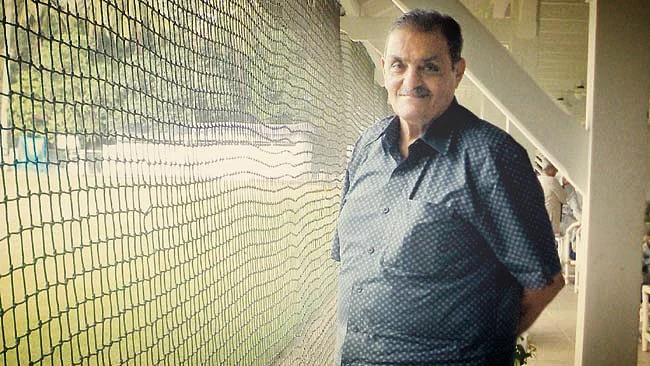Late former Tamil Nadu chief minister J Jayalalithaa had once confessed on national television of having a huge crush on former Indian captain Nari Contractor. In fact, she admitted that she used to go to Test matches just to watch him. Such was his charisma and persona.
However, whenever Nari Contractor has been a topic of discussion among cricket aficionados, it was always the tragic end to his Indian cricketing career which stole the thunder. But why feel sorry for a sportsperson who was an ‘epitome of courage’. Instead there should be a celebration of his cricketing career which was all about divine intervention right from the word go.
Despite being a Mumbai boy, Nari never played for Mumbai. As fate would have had it, he ended up playing for Gujarat.
How did that happen? How could a Mumbai lad could play for Gujarat, that too at a time when the domestic rules were so stringent?
That is where the intervention happened. Nari Contractor’s story could put even a Manmohan Desai’s movie to shame.
Nari’s pregnant mother was on her way back from Gujarat to Mumbai for her delivery when she started feeling uneasy. Nari’s uncle, who was the engine driver on the same train, decided to take her off the train at Godhra once his duty finished. A son was born to her on the same day while she was in Godhra.
Thus, even before little Nari could walk, all roads were cleared so that he is eligible to play for Gujarat.
This was only the first half of the story.
The second bit began two decades later when Nari caught the eyes of Gujarat captain Phiroz Khambata during the selection matches for Mumbai Cricket Association (MCA) in 1955.
Impressed by Nari’s performance, he offered him an opportunity to play for his state. But Nari, who had done well in the trials and was confident that he would get selected, rejected Khambata’s offer.
Eventually Nari wasn't selected for the MCA. Without wasting any time, he sent a cocky telegram to the Gujarat Cricket Association (GCA) which read 'available if selected'. On the same day, the Gujarat team was set to play Baroda. Despite that he received a telegram from GCA, asking him to reach Baroda for trials.
Nari exuberated confidence while batting in the nets. But still he wasn’t sure whether he was part of the playing XI or not. While the team was being announced, Nari waited with bated breath. The last name was his. Captain Khambatha had dropped himself to include Nari.
Batting in the middle order, Nari scored hundreds in both the innings, a debut record that he still holds in Indian cricket.
His Indian team career was equally dramatic.
After being selected for India, Nari became an opener when Vinoo Mankad didn't turn up for a Test match against New Zealand at Delhi in 1955.
A player who wasn’t good enough for his state team had made his debut for the national side within a year’s span.
The Gods of cricket had done their job.
Nari’s first big innings came against West Indies at Delhi in 1958-59, where he scored 92. On the 1959 tour to England, in the second Test at Lord's, he suffered a broken rib but carried on to score 81 in a total of 168. Against Australia in 1959-60, he scored 438 runs, notching up his first – and his only – Test century, at Mumbai. At 26, he became the youngest Indian captain against Pakistan. In 1961-62, he led India to a historic series victory over England.
He was at his peak both as captain and batsman when his international career was cut short by a bouncer from Charlie Griffith in a tour game against Barbados in 1962, which struck him on his skull.
His life was in danger for a few hours and he needed several emergency operations.
Almost two years later, the left handed opening batsman played his first first-class cricket match. But despite a brave attempt to return to Test cricket, he never could quite make it. Nari continued to play first-class cricket till 1975, scoring 8,611 runs at an average of 39.86 with 22 hundreds.
There is a story involving Nari and Tiger Pataudi. While playing a domestic match against Nari’s team, Tiger had asked his bowlers not to bowl short once Nari comes to bat and to keep the bowl on the off-side to make sure Nari doesn’t get injured at the susceptible spot on his skull. Tiger’s bowlers did what their captain had asked. Sensing something fishy, Nari went to Tiger and enquired about his bowlers’ line. When Tiger told him the reason, Nari snapped at him and asked him to stop the plan at once.
It is believed that the selectors never chose him because they were afraid of what might happen were he to be hit on the head again.
When officials asked his wife how she could allow him to continue, she replied. “The very fact he is here today is his destiny,” she replied. “Who am I to tinker with his destiny?”
A sportsperson who is an ‘epitome of courage’ would never like to be remembered for a tragic incident in his career but would love to be celebrated for greater glories in the same career.
We all should try to look at Nari Contractor the way the late Jayalalithaa would have while he dispatched the bowlers to the boundary.
(At The Quint, we question everything. Play an active role in shaping our journalism by becoming a member today.)
